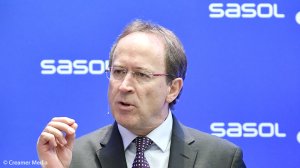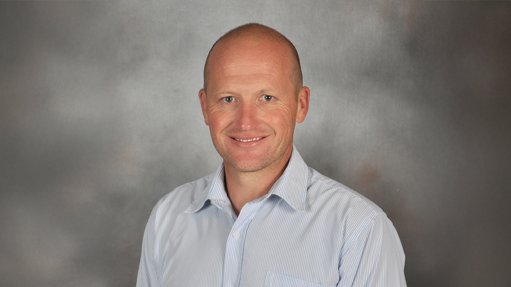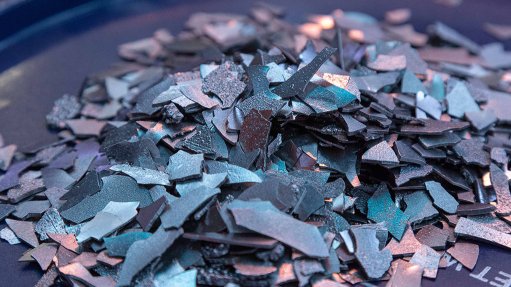Sasol prioritising coal de-stoning investment as it seeks to allay fears over big Secunda output dip

Sasol CEO Fleetwood Grobler on the medium-term interventions being taken to ensure that Secunda's production profile remains above 6.7-million tons, while meeting 30% decarbonisation commitment. Recorded: 26.02.2024 Editing: Shadwyn Dickinson
Energy and chemicals group Sasol has moved to address investor concerns that its yearly production at Secunda will need to fall to only 6.7-million tons for it to meet its goal of reducing the carbon-heavy Mpumalanga complex’s greenhouse gas emissions by 30% by 2030.
Delivering his final results presentation, outgoing CEO Fleetwood Grobler insisted that the 6.7-million tons output profile announced in August represented the “low road” production scenario that emerged following a review of its emission roadmap once the use of liquefied natural gas (LNG) was eliminated as a plausible feedstock for Secunda.
The review resulted in Sasol impairing the Secunda asset by R35-billion.
The JSE group had since progressed with various mitigation actions to ensure that volumes did not fall below 7-million tons while still meeting the goal of reducing coal volumes by 25% by 2030 and honouring its increasingly urgent decarbonisation commitments.
Central to these plans is a coal de-stoning initiative, designed to recover its coal quality, alongside initiatives to stabilise volumes through coal purchases and possibly by diverting export coal to Secunda in line with an expectation that the seaborne market will weaken as countries reduce their reliance on the energy mineral.
Sasol is already familiar with the dense-medium separation technology that will be employed to de-stone the coal and expects to make a final investment decision (FID) this year, having already made significant progress in securing the necessary environmental approvals.
Grobler refused to be drawn on the investment value and told Engineering News in an interview that the capital expenditure figure would be revealed only once the FID was made.
“The project is progressing at pace because it’s one of the biggest value-unlock projects we have, so it’s a priority for us,” Grobler said in an interview, following the release of the group’s interim results.
Sasol’s headline earnings a share fell 34% to R20.37 in the six months to December 31, 2023, from R30.90 in the previous comparable period.
Grobler said the de-stoning project, together with the group’s other initiatives to improve coal quality and supply, could result in Secunda’s production volumes recovering to about 7.5-million tons in the latter part of the current decade.
The bulk of the decarbonisation would, thus, arise from the group’s plan to turn down its power station boilers, rather than its gasifiers.
“There's a big misconception that we have to go to 6.7-million to meet our decarbonisation target,” Grobler told Engineering News.
Sasol expects Forestry, Fisheries and the Environment Minister Barbara Creecy to make a decision next month on its controversial proposed alternative approach for measuring the sulphur dioxide (SO2) emissions from the 17 coal boilers at Secunda. Grobler reiterated that a refusal by the Minister would result in the phased shutdown of Secunda.
Should it receive approval, the commitment to reducing its coal consumption by 25% would be met by the boiler turndown plan, which would also enable it to meet its SO2 legal obligations and most of its decarbonisation, the balance of which would be met through a reduction in Secunda’s output to 7-million tons by 2030.
“This means that the alternative source of carbon required to supplement production is not equivalent to the full 25% cost reduction,” Grobler stressed.
NO GAS-CLIFF REPRIEVE
The group was working on a range of feedstock options, including raising the proportion of gas used in Secunda’s production process from about 10% currently to about 13%.
The gas option would depend materially on the group’s exploration success in southern Mozambique, where four additional wells had extended the supply plateau to 2028 and where there may be potential to extend the plateau to 2030 should the recent PT5-C gas discovery prove commercially viable.
However, Grobler stressed that no extension was envisaged for industrial users in South Africa, which were warning of a gas supply “day zero” in 2026. This, because of Sasol’s calculation that it would be unable to recover the cost of its exploration and development investments under the current regulated pricing formula.
“We've indicated the gas reservoir, which we have been operating since 2004, is now in its natural decline, and we've given notice that this decline starts in the period of our 2025/26 financial year.
“Now we've reinvested in that to extend the plateau up to 2028, but that investment is not recoverable as part of the cost that is currently reflected in the gas pricing,” Grobler said, adding that the next best alternative for the industrial users would be the import of LNG, albeit at a higher cost.
Meanwhile, the group was pressing ahead with its plan to install 1 200 MW of wind and solar by 2030, revealing that 498 MW of the 600 MW procured for Secunda had achieved financial close.
Article Enquiry
Email Article
Save Article
Feedback
To advertise email advertising@creamermedia.co.za or click here
Press Office
Announcements
What's On
Subscribe to improve your user experience...
Option 1 (equivalent of R125 a month):
Receive a weekly copy of Creamer Media's Engineering News & Mining Weekly magazine
(print copy for those in South Africa and e-magazine for those outside of South Africa)
Receive daily email newsletters
Access to full search results
Access archive of magazine back copies
Access to Projects in Progress
Access to ONE Research Report of your choice in PDF format
Option 2 (equivalent of R375 a month):
All benefits from Option 1
PLUS
Access to Creamer Media's Research Channel Africa for ALL Research Reports, in PDF format, on various industrial and mining sectors
including Electricity; Water; Energy Transition; Hydrogen; Roads, Rail and Ports; Coal; Gold; Platinum; Battery Metals; etc.
Already a subscriber?
Forgotten your password?
Receive weekly copy of Creamer Media's Engineering News & Mining Weekly magazine (print copy for those in South Africa and e-magazine for those outside of South Africa)
➕
Recieve daily email newsletters
➕
Access to full search results
➕
Access archive of magazine back copies
➕
Access to Projects in Progress
➕
Access to ONE Research Report of your choice in PDF format
RESEARCH CHANNEL AFRICA
R4500 (equivalent of R375 a month)
SUBSCRIBEAll benefits from Option 1
➕
Access to Creamer Media's Research Channel Africa for ALL Research Reports on various industrial and mining sectors, in PDF format, including on:
Electricity
➕
Water
➕
Energy Transition
➕
Hydrogen
➕
Roads, Rail and Ports
➕
Coal
➕
Gold
➕
Platinum
➕
Battery Metals
➕
etc.
Receive all benefits from Option 1 or Option 2 delivered to numerous people at your company
➕
Multiple User names and Passwords for simultaneous log-ins
➕
Intranet integration access to all in your organisation



















